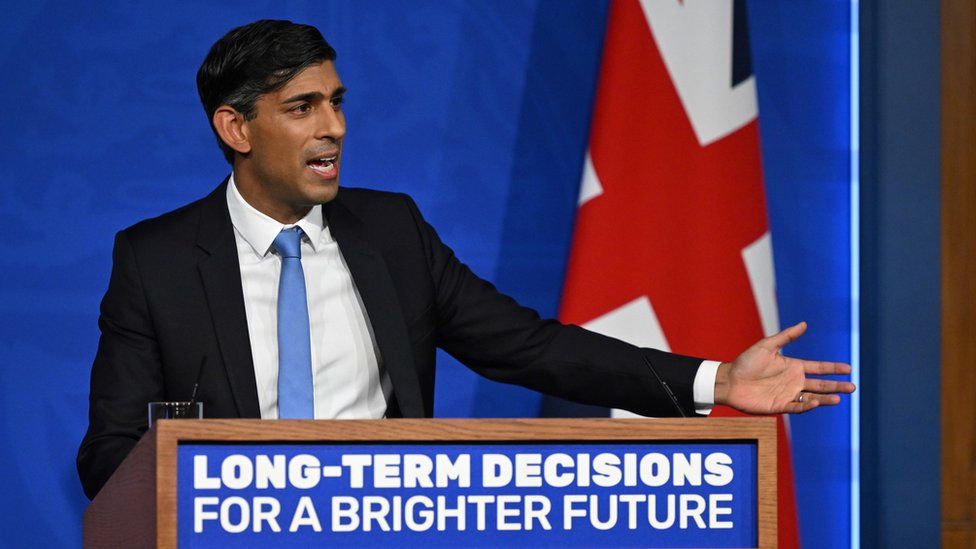ARTICLE AD BOX
 Image source, PA Media
Image source, PA Media
Rishi Sunak has delivered a speech in which he set out changes to the government's green commitments.
This includes delaying a ban on the sale of new petrol and diesel cars, as well as a promise not to move ahead with proposals for things including car-pooling and taxes on meat.
However, the prime minister insisted that he was committed to reaching net zero carbon emissions by 2050 - this is the where a country does not add any additional greenhouse gases like carbon dioxide to the atmosphere.
Here are some of key takeaways from his speech:
A delay on a ban of new diesel and petrol vehicles to 2035
Mr Sunak said that people would still be able to buy new diesel and petrol vehicles until 2035 - a delay of five years on the previous plan, which set out to ban them by 2030.
He added that even after that, petrol and diesels cars would still be able to be sold second hand, saying a similar approach is being taken in countries such as Germany, France and Spain.
The prime minister said the change was being made to give people more time to make the transition to electric vehicles, saying the "upfront cost is still high".
"It should be you the consumer that makes that choice, not government forcing you to do it," he added.
However, he said that he still expects the "vast majority" of cars sold by 2030 to be electric, "because the costs are reducing, the range is improving, the charging infrastructure is growing".
What about boilers?
The speech also touched on the heating of homes, particularly efforts to transition from boilers to heat pumps, although there were no major policy changes in this area.
The government has set out an exemption to phase out fossil fuel boilers by 2035 - pushing it back from 2026. This is expected to cover about a fifth of homes.
Mr Sunak also announced an increase in grants to help those making the transition from boilers to heat pumps - this would rise from £5,000 to £7,500.
"There are no strings attached - the money will never need to be repaid," he said, adding that people would not be forced to make the change.
"We'll never force anyone to rip out their existing boiler and replace it with a heat pump," he said.
No new energy efficiency targets on homes
The prime minister also pledged to scrap policies that would force landlords to upgrade energy efficiency in their homes, but would "encourage" households to do so.
The old policy was that from 2025, new tenancies would only be possible on properties with an Energy Performance Certificate (EPC) of C or higher - from 2028, this would apply to existing tenancies as well. Both have been scrapped.
An EPC shows how energy-efficient a building is, in relation to the amount of heat and light it uses, and gives scores ranging from A-G.
Mr Sunak also said his government would "continue to subsidise energy efficiency".
Net Zero 2050 target remains
Despite the policy changes, Mr Sunak insists that the net zero target for 2050 would remain in place, but insisted that he wants to bring people along with him.
He called this "the only realistic path" to net zero, saying that people needed honesty and pragmatism.
"That's how we'll turn the challenge of net zero into the greatest opportunity - and the proudest achievement - of our lifetimes," he said.
He also confirmed he will attend COP28, which will take place in Dubai in late November and early December, where he promised to "set out the next stage in our ambitious environmental agenda".
And what about recycling?
Sunak also said that the debate around net zero has "thrown up a range of worrying proposals" that would never be approved under his government.
This included policies on car-pooling, which he promised to scrap, and also said he was scrapping a proposal that the government "should force you to have seven different bins in your home".
The prime minister also said he would scrap a proposal that meat should be taxed, saying this would force people to change their diets and "harm British farmers".
None of these proposals have previously been adopted, but had been discussed as potential policies that could help the UK reach its net zero targets.
Other proposals he said would be halted included taxes that "discourage flying or going on holiday", as well as a ban on new oil and gas in the North Sea - this "would simply leave us reliant on expensive, imported energy", he said.

 1 year ago
58
1 year ago
58








 English (US)
English (US)